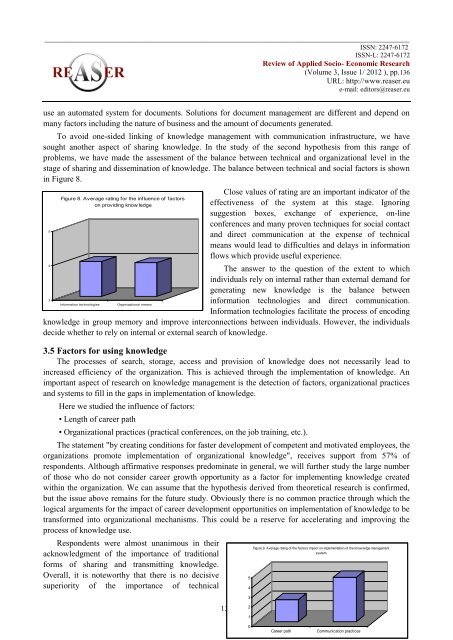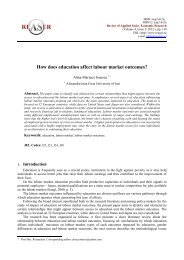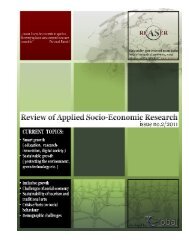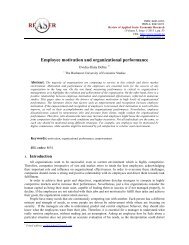Volume 3, ISSUE1/2012 - Review of Applied Socio-Economic ...
Volume 3, ISSUE1/2012 - Review of Applied Socio-Economic ...
Volume 3, ISSUE1/2012 - Review of Applied Socio-Economic ...
Create successful ePaper yourself
Turn your PDF publications into a flip-book with our unique Google optimized e-Paper software.
________________________________________________________________________________________________<br />
ISSN: 2247-6172<br />
ISSN-L: 2247-6172<br />
<strong>Review</strong> <strong>of</strong> <strong>Applied</strong> <strong>Socio</strong>- <strong>Economic</strong> Research<br />
(<strong>Volume</strong> 3, Issue 1/ <strong>2012</strong> ), pp.136<br />
URL: http://www.reaser.eu<br />
e-mail: editors@reaser.eu<br />
use an automated system for documents. Solutions for document management are different and depend on<br />
many factors including the nature <strong>of</strong> business and the amount <strong>of</strong> documents generated.<br />
To avoid one-sided linking <strong>of</strong> knowledge management with communication infrastructure, we have<br />
sought another aspect <strong>of</strong> sharing knowledge. In the study <strong>of</strong> the second hypothesis from this range <strong>of</strong><br />
problems, we have made the assessment <strong>of</strong> the balance between technical and organizational level in the<br />
stage <strong>of</strong> sharing and dissemination <strong>of</strong> knowledge. The balance between technical and social factors is shown<br />
in Figure 8.<br />
5<br />
Figure 8. Average rating for the influence <strong>of</strong> factors<br />
on providing know ledge<br />
Close values <strong>of</strong> rating are an important indicator <strong>of</strong> the<br />
effectiveness <strong>of</strong> the system at this stage. Ignoring<br />
suggestion boxes, exchange <strong>of</strong> experience, on-line<br />
conferences and many proven techniques for social contact<br />
and direct communication at the expense <strong>of</strong> technical<br />
means would lead to difficulties and delays in information<br />
flows which provide useful experience.<br />
4<br />
The answer to the question <strong>of</strong> the extent to which<br />
individuals rely on internal rather than external demand for<br />
generating new knowledge is the balance between<br />
3<br />
information technologies and direct communication.<br />
Information technologies<br />
Organizational means<br />
Information technologies facilitate the process <strong>of</strong> encoding<br />
knowledge in group memory and improve interconnections between individuals. However, the individuals<br />
decide whether to rely on internal or external search <strong>of</strong> knowledge.<br />
3.5 Factors for using knowledge<br />
The processes <strong>of</strong> search, storage, access and provision <strong>of</strong> knowledge does not necessarily lead to<br />
increased efficiency <strong>of</strong> the organization. This is achieved through the implementation <strong>of</strong> knowledge. An<br />
important aspect <strong>of</strong> research on knowledge management is the detection <strong>of</strong> factors, organizational practices<br />
and systems to fill in the gaps in implementation <strong>of</strong> knowledge.<br />
Here we studied the influence <strong>of</strong> factors:<br />
• Length <strong>of</strong> career path<br />
• Organizational practices (practical conferences, on the job training, etc.).<br />
The statement "by creating conditions for faster development <strong>of</strong> competent and motivated employees, the<br />
organizations promote implementation <strong>of</strong> organizational knowledge", receives support from 57% <strong>of</strong><br />
respondents. Although affirmative responses predominate in general, we will further study the large number<br />
<strong>of</strong> those who do not consider career growth opportunity as a factor for implementing knowledge created<br />
within the organization. We can assume that the hypothesis derived from theoretical research is confirmed,<br />
but the issue above remains for the future study. Obviously there is no common practice through which the<br />
logical arguments for the impact <strong>of</strong> career development opportunities on implementation <strong>of</strong> knowledge to be<br />
transformed into organizational mechanisms. This could be a reserve for accelerating and improving the<br />
process <strong>of</strong> knowledge use.<br />
Respondents were almost unanimous in their<br />
acknowledgment <strong>of</strong> the importance <strong>of</strong> traditional<br />
forms <strong>of</strong> sharing and transmitting knowledge.<br />
Overall, it is noteworthy that there is no decisive<br />
superiority <strong>of</strong> the importance <strong>of</strong> technical<br />
5<br />
4<br />
Figure 9. Average rating <strong>of</strong> the factors impact on implementation <strong>of</strong> the know ledge management<br />
system.<br />
136<br />
3<br />
2<br />
1<br />
0<br />
Career path<br />
Communication practices








